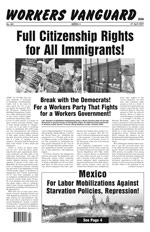
The Russian Revolution and the Fight for Black Freedom (Quote of the Week) As Trotskyist leader James P. Cannon explained in a 1959 essay, Lenin and Trotsky’s Communist International won American Communists to the understanding that the fight against the special oppression of black people was of central importance to the proletarian revolutionary struggle. The earlier socialist movement, out of which the Communist Party was formed, never recognized any need for a special program on the Negro question. It was considered purely and simply as an economic problem, part of the struggle between the workers and the capitalists; nothing could be done about the special problems of discrimination and inequality this side of socialism…. It is customary to attribute the progress of the Negro movement, and the shift of public opinion in favor of its claims, to the changes brought about by the First World War. But the biggest thing that came out of the First World War, the event that changed everything, including the prospects of the American Negro, was the Russian Revolution. The influence of Lenin and the Russian Revolution, even debased and distorted as it later was by Stalin, and then filtered through the activities of the Communist Party in the United States, contributed more than any other influence from any source to the recognition, and more or less general acceptance, of the Negro question as a special problem of American society—a problem which cannot be simply subsumed under the general heading of the conflict between capital and labor, as it was in the pre-communist radical movement…. Everything new on the Negro question came from Moscow—after the Russian Revolution began to thunder its demand throughout the world for freedom and equality for all national minorities, all subject peoples and all races—for all the despised and rejected of the earth. —James P. Cannon, “The Russian Revolution and the American Negro Movement,” The First Ten Years of American Communism (1962)
|
|
||||||||||||||||||||||||||||||||||||||||||||||||||


